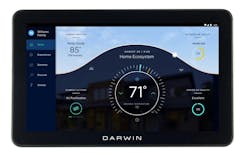The great bulk of our lives takes place indoors. On average, Americans spend about 90 percent of their time indoors, according to the EPA.
And that has ramifications for our health. The concentrations of some pollutants can be two to five times higher inside than outside, the EPA reports.
The problem has only gotten worse with the pandemic. While reduced vehicle traffic helped outdoor air get cleaner, indoor air quality declined, as people have had more exposure to chemicals from consumer products such as electronics and furnishings, and as they cooked and cleaned more—two activities known to contaminate indoor air, according to Scientific American.
— Paul Scialla, founder and CEO, Delos
“Even more so now, we spend a lot of time in our homes, and everything indoors has an impact on us,” says Paul Scialla, founder and CEO, Delos.
Since its start in New York in 2012, Delos has researched and worked to improve the ways that people’s homes affect their health. “This is an area we’ve felt for years has been largely overlooked: focusing on the human condition inside walls and roofs and using our homes as a healthcare intervention tool to enhance health outcomes,” Scialla says.
Two years ago, Delos launched its own intervention tool: Darwin Home Wellness Intelligence (Darwin). It monitors and calibrates air filtration, water purification, comfort-focused technologies, and circadian lighting (lighting that supports the body’s internal 24-hour clock).
HOW DELOS DARWIN WORKS
Delos doesn’t produce the various hardware components, such as the filtration systems. Instead, it vets manufacturers to identify the products that deliver health benefits.
“Then we invite those hardware components into the Darwin ecosystem and make them Darwin-compatible,” Scialla says. Darwin is the software—or the “library of algorithms,” as Scialla calls it—that monitors and calibrates the hardware.
“Darwin is like a wellness brain for the home,” Scialla says.
For instance, Darwin monitors pollutants and toxins in the air. If homeowners track in a lot of dust on their shoes, cook with a lot of oils in their kitchens, or get a little too generous with the hairspray in their bathrooms, Darwin’s sensors alert the HVAC system to start cycling the indoor air through its filters.
Delos can’t yet do the same thing for water: “The technology is not quite there yet from a remediation standpoint,” Scialla says. But Darwin can alert homeowners when it’s time to change water filters to rid their tap water of chlorine, heavy materials, and other particles.
Darwin’s lighting system has various settings to promote relaxing or energizing. To help people get a good night’s sleep, it can simulate sunrise or sunset by adjusting the lights and slowly raising or lowering the shades. (Darwin can also automatically keep the bedroom pleasantly cool at night and gradually increase its temperature just before it’s time to wake up.)
Homeowners can access the application programming interface (API) directly through the Darwin app on a Wi-Fi-enabled tablet that displays metrics on conditions across the home. Or they can integrate Darwin into their own smart-home systems, like those from Crestron.
The cost of a Darwin system can range anywhere from just over $1,000 to $30,000—depending on the size of the home and the technologies and devices that the builder or homeowner wants.
“It really depends on the hardware components,” Scialla says. Delos plans to release a plug-and-play Darwin solution for any home that Scialla says can be installed quickly and affordably.
BUILDERS ADOPT HOME WELLNESS SOLUTIONS
In 2018, Darwin first appeared in 1,000 new entry-level homes in Australia. Last year, Delos announced its first partnership with a volume production homebuilder, KB Home. The nation’s seventh-largest builder by revenue according to Pro Builder’s 2020 Housing Giants, KB Home offered Darwin as an optional upgrade on some homes in a 110-unit development in Irvine, Calif. Of the 10 homes sold by August, eight took the Darwin option.
In July, MultiGreen Partners, a developer specializing in affordable and sustainable multifamily housing, announced it would integrate Darwin into 40,000 units.
For Scialla and his brother, Peter Scialla, who serves as Delos’ president and COO, the light-bulb moment happened years ago when the twins and former Goldman Sachs partners realized the smart-home industry talked a lot about the convenience of connected devices—but hardly at all about their potential health and wellness benefits. “We felt the dialogue around human health was largely missing,” Paul Scialla says. “We wanted to make sure wellness interventions are incorporated in the automated world.”
Scialla says Delos has invested over $100 million in its research and technology. Delos’ backers include Bill Gates’ personal investment office, and its advisory board comprises luminaries such as Leonardo DiCaprio and Deepak Chopra. With both its Darwin technology and its International Well Building Institute, which administers a certification for healthy buildings, Delos aims to play a leading role in the global wellness real estate market—valued at $134 billion in 2018 and expected to increase to almost $200 billion by 2022, according to the Global Wellness Institute.
“We want any homeowner anywhere in the country or world at any price point to have wellness intelligence enabled in their home,” Scialla says. “Health and wellness should be a right rather than a privilege, so we designed the Darwin program that way. This is for the masses.”
